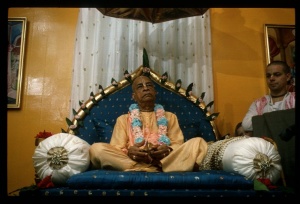SB 7.2.49: Difference between revisions
m (1 revision(s)) |
No edit summary |
||
| Line 1: | Line 1: | ||
{{info | {{info | ||
|speaker= | |speaker=Yamarāja in the form of a boy | ||
|listener=Queens of King | |listener=Queens of King Suyajña | ||
}} | }} | ||
[[Category:Srimad-Bhagavatam - Canto 07 Chapter 02]] | |||
[[Category:Bhagavatam Verses Spoken by Yamaraja - Vanisource|070249]] | |||
<div style="float:left">'''[[Srimad-Bhagavatam]] - [[SB 7|Seventh Canto]] - [[SB 7.2: Hiranyakasipu, King of the Demons|Chapter 2: Hiraṇyakaśipu, King of the Demons]]'''</div> | |||
<div style="float:right">[[File:Go-previous.png|link=SB 7.2.48]] '''[[SB 7.2.48]] - [[SB 7.2.50]]''' [[File:Go-next.png|link=SB 7.2.50]]</div> | |||
{{RandomImage}} | |||
==== TEXT 49 ==== | ==== TEXT 49 ==== | ||
<div | <div class="verse"> | ||
atha nityam anityaṁ vā | :atha nityam anityaṁ vā | ||
neha śocanti tad-vidaḥ | :neha śocanti tad-vidaḥ | ||
nānyathā śakyate kartuṁ | :nānyathā śakyate kartuṁ | ||
sva-bhāvaḥ śocatām iti | :sva-bhāvaḥ śocatām iti | ||
</div> | </div> | ||
| Line 17: | Line 22: | ||
==== SYNONYMS ==== | ==== SYNONYMS ==== | ||
<div | <div class="synonyms"> | ||
''atha''—therefore; ''nityam''—the eternal spirit soul; ''anityam''—the temporary material body; ''vā''—or; ''na''—not; ''iha''—in this world; ''śocanti''—they lament for; ''tat-vidaḥ''—those who are advanced in knowledge of the body and soul; ''na''—not; ''anyathā''—otherwise; ''śakyate''—is able; ''kartum''—to do; ''sva-bhāvaḥ''—the nature; ''śocatām''—of those prone to lamentation; ''iti''—thus. | |||
</div> | </div> | ||
| Line 24: | Line 29: | ||
==== TRANSLATION ==== | ==== TRANSLATION ==== | ||
<div | <div class="translation"> | ||
Those who have full knowledge of self-realization, who know very well that the spirit soul is eternal whereas the body is perishable, are not overwhelmed by lamentation. But persons who lack knowledge of self-realization certainly lament. Therefore it is difficult to educate a person in illusion. | Those who have full knowledge of self-realization, who know very well that the spirit soul is eternal whereas the body is perishable, are not overwhelmed by lamentation. But persons who lack knowledge of self-realization certainly lament. Therefore it is difficult to educate a person in illusion. | ||
</div> | </div> | ||
| Line 31: | Line 36: | ||
==== PURPORT ==== | ==== PURPORT ==== | ||
<div | <div class="purport"> | ||
According to the mīmāṁsā philosophers, everything is eternal, nitya, and according to the Sāṅkhya philosophers everything is mithyā, or | According to the ''mīmāṁsā'' philosophers, everything is eternal, ''nitya'', and according to the Sāṅkhya philosophers everything is ''mithyā'', or ''anitya''—impermanent. Nonetheless, without real knowledge of ''ātma''—, the soul, such philosophers must be bewildered and must continue to lament as ''śūdras''. Śrīla Śukadeva Gosvāmī therefore said to Parīkṣit Mahārāja: | ||
:śrotavyādīni rājendra | :''śrotavyādīni rājendra'' | ||
:nṛṇāṁ santi sahasraśaḥ | :''nṛṇāṁ santi sahasraśaḥ'' | ||
:apaśyatām ātma-tattvaṁ | :''apaśyatām ātma-tattvaṁ'' | ||
:gṛheṣu gṛha-medhinām | :''gṛheṣu gṛha-medhinām'' | ||
"Those who are materially engrossed, being blind to knowledge of the ultimate truth, have many subjects for hearing in human society, O Emperor." ([[SB 2.1.2]]) For ordinary persons engaged in material activities there are many, many subject matters to understand because such persons do not understand self-realization. One must therefore be educated in self-realization so that under any circumstances in life he will remain steady in his vows. | "Those who are materially engrossed, being blind to knowledge of the ultimate truth, have many subjects for hearing in human society, O Emperor." ([[SB 2.1.2]]) For ordinary persons engaged in material activities there are many, many subject matters to understand because such persons do not understand self-realization. One must therefore be educated in self-realization so that under any circumstances in life he will remain steady in his vows. | ||
</div> | </div> | ||
__NOTOC__ | |||
<div style="float:right; clear:both;">[[File:Go-previous.png|link=SB 7.2.48]] '''[[SB 7.2.48]] - [[SB 7.2.50]]''' [[File:Go-next.png|link=SB 7.2.50]]</div> | |||
__NOTOC__ | |||
__NOEDITSECTION__ | |||
Revision as of 18:08, 24 May 2021

A.C. Bhaktivedanta Swami Prabhupada
TEXT 49
- atha nityam anityaṁ vā
- neha śocanti tad-vidaḥ
- nānyathā śakyate kartuṁ
- sva-bhāvaḥ śocatām iti
SYNONYMS
atha—therefore; nityam—the eternal spirit soul; anityam—the temporary material body; vā—or; na—not; iha—in this world; śocanti—they lament for; tat-vidaḥ—those who are advanced in knowledge of the body and soul; na—not; anyathā—otherwise; śakyate—is able; kartum—to do; sva-bhāvaḥ—the nature; śocatām—of those prone to lamentation; iti—thus.
TRANSLATION
Those who have full knowledge of self-realization, who know very well that the spirit soul is eternal whereas the body is perishable, are not overwhelmed by lamentation. But persons who lack knowledge of self-realization certainly lament. Therefore it is difficult to educate a person in illusion.
PURPORT
According to the mīmāṁsā philosophers, everything is eternal, nitya, and according to the Sāṅkhya philosophers everything is mithyā, or anitya—impermanent. Nonetheless, without real knowledge of ātma—, the soul, such philosophers must be bewildered and must continue to lament as śūdras. Śrīla Śukadeva Gosvāmī therefore said to Parīkṣit Mahārāja:
- śrotavyādīni rājendra
- nṛṇāṁ santi sahasraśaḥ
- apaśyatām ātma-tattvaṁ
- gṛheṣu gṛha-medhinām
"Those who are materially engrossed, being blind to knowledge of the ultimate truth, have many subjects for hearing in human society, O Emperor." (SB 2.1.2) For ordinary persons engaged in material activities there are many, many subject matters to understand because such persons do not understand self-realization. One must therefore be educated in self-realization so that under any circumstances in life he will remain steady in his vows.